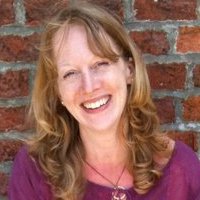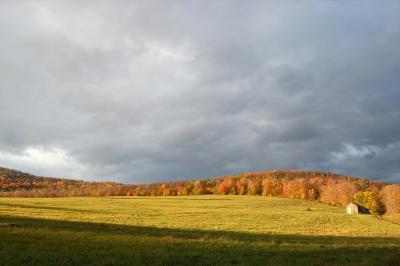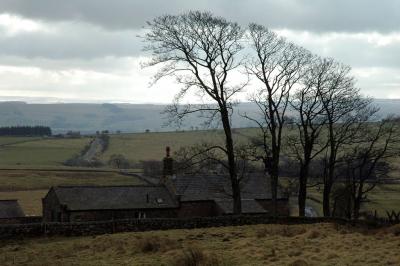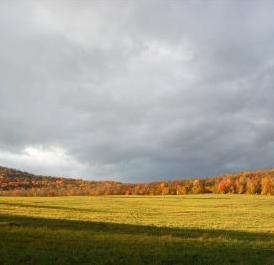MELODY NIXON interviews NICOLA WALDRON

In this month’s author Q&A, Melody Nixon speaks with Nicola Waldron about finding and feeling at home, the American Dream versus the British Dream, and wanderlust. Waldron’s essay “The Land Up North” appeared in Issue No. 04 of The Common.
MN: In your essay “The Land Up North” you write about the sense of security and possibility afforded you by the land that you and your husband bought in the Catskills. The essay is poetically written, highly evocative of place, and has an appealing lightness of language. Who are your influences? Do you read mainly nonfiction?
NW: That essay was written when I was reading a lot of nonfiction. Dinah Lenney, the author of “Bigger than Life,” was my teacher at Bennington and is one of my great hero-mentors. She recommended to me Abigail Thomas’s work, especially her book “Safekeeping,” and my essay was written in response to that book. I’d also just been reading Jo Ann Beard.
MN: I understand you are currently writing a nonfiction book, is this also place-based?
NW: I’m writing a book about life in London, it’s sort of a historic document cum memoir cum novella. It’s something I never intended to write about. When I lived in London from 1989 to 1992 I worked at what I call in the memoir “The Big Theater” — a large arts center in London — under the reign of Margaret Thatcher, in the moment when she was about to be ousted from power, and at the time that Nelson Mandela was being released, and the Berlin Wall was coming down. It’s an erotic, romantic memoir about working at the theater during an incredible moment in history, both nationally and internationally.
MN: In “The Land up North” you say that the land you own provides opportunities “to dream,” “to propagate,” to heal. How is owning land different from owning another kind of residential property (an apartment, or a house in the ‘burbs), and why does it allow one “to dream” so?
NW: As you say, owning land holds out a sense of possibility, sort of like a pregnancy, or youth — the dream of one day, maybe, taking a little corner of the earth and calling it my home. I’ve always felt trapped inside buildings, inside cities. I’m only really happy in a library or a room I’ve furnished myself (temporarily), or someplace that looks out over wilderness. I love windows, big windows. I love balconies and porches and gardens. I’m always, in the back, of my mind, thinking about “outside” and wishing myself there. So, though I do dream of owning a cottage or cabin, it’s always “a cottage by the sea” or “a cabin in the woods.” The land in the Catskills suits my inborn need for openness and expansiveness. But because we own [the land] it also feels “safe” — as if I won’t come to harm there because it “belongs” to us: no one can trespass! In England, [where I’m from and where I lived until 1996] as far as I’m aware, there isn’t any land to buy, not open land. You might be able to buy a construction site. [Owning land] was never something even imaginable to me growing up there.

MN: How did the concept of owning land become imaginable when you moved to the U.S.?
NW: When I came to America, my husband had a 38-acre parcel of wild land his grandfather had left him. He would talk about “the land,” “my grandfather’s land,” “my land,” and I was mesmerized. In America, I thought, you root yourself by owning a tiny corner of the great continent. Your forebears hand down land — something of both use and beauty. A place to live. You would never be homeless here. See how idealistic I sound. I am, still — in part because I know, whatever happens, I have a place to go.
MN: So is land really unavailable for purchase in England?
NW: I don’t know the exact truth about this, just that, growing up, no one ever mentioned to me the idea of passing on or buying land. My parents’ dream was to own a house, and to travel abroad. I also remember hearing things like “The Queen could walk the length of England without ever leaving her own land,” and similar things about the Church of England and some ancient universities. Land seemed, indeed, to be only something that belonged to the landed gentry and their children. If you weren’t (aren’t) born into that kind of aristocracy, then it didn’t (doesn’t) even figure… Part of the reason I hated living there. I felt eternally restrained… No such thing as the British Dream!
MN: In the U.S. there are indigenous people who lived on the land before colonizers came. I myself come from a colonial state, and my family bought land that had at one time been lived on and cared for by Maori people. This complicates my relationship to the land, as a British descendent and white person. I dream of buying land myself one day, to grow vegetables and build a writing hut, but respecting the history of the land is very important to me. I want to know who lived there before me, and whether I am taking land from someone who was forced off it. Did these thoughts come to mind for you in the process of buying land?
NW: They should have crossed my mind, but they didn’t, I fear. I guess I considered myself indigenous in England (“we” were invaded by the Romans) and I didn’t really think about those specific issues till I came to the States, except that I was always horrified by the behavior of past British imperialists and colonizers. I was glad, as a child, that we were giving back all those colonies (mostly too late). In the 1980s when I was in high school, we read Paul Scott’s “Staying On,” about a couple who remained in India after independence, so I was aware of my ancestors mostly as pathetic bullies, left to back off with their tails between their legs.
British laws do protect public “Rights of Way” (there’s been a more recent “Right to Roam” law) and allowing public access to most privately owned land always meant we could walk pretty much where we wanted.
MN: You mention there’s no such thing as the “British dream.” What about the American Dream? Do you think that is real, and if so, what does it represent to you as a migrant?
NW: From my experience, I have to say yes. I came over here because I got married to an American. When we got married there wasn’t really a question of where we would live. There was a sense that to live in England would be to restrict ourselves in terms of career opportunities and financial stability. I knew from my visits [to America] that the country offered a sense of possibility that I’d rarely felt in England, particularly in terms of career possibilities and gender equality. I grew up in a time of men and boys still having the upper hand. Margaret Thatcher’s reign had not fulfilled the dreams she had promised. I thought, this is not a country that’s going to nurture a woman or someone who has political ideas that are different to Thatcher’s. In America, Bill Clinton was president. This had an influence on how I felt about coming here. It seemed like a place that was progressive.
MN: If the British Dream did exist, what would it promise? What does England value?
NW: In England in some quarters there’s an appreciation of the land, a value placed on public access to the land, as demonstrated in the “Right to Roam” laws I mentioned. I grew up being taken by my mother across farmers’ fields for miles and miles, and I never had a feeling of, Oh, we can’t do this. This valuing of the land is perhaps something that is being lost, and I suppose a perfect England would expand on it instead of minimize it.

I was watching Patrick Keiller’s Robinson films recently. In these [Keiller] focuses on the total covering of the landscape by buildings and highways, and my perfect England would raze, all of that. Geoff Dyer talks about this in his book Out of Sheer Rage: he talks about the town D.H. Lawrence grew up in, in Nottingham. He thinks that the best tribute to Lawrence would be to raze the town, and let it return to its natural state. I guess that’s how I feel about much of England. So the British Dream for me would be a sort of socialist colony upon a green land. Like New Zealand.
MN: Or, how New Zealand was envisioned perhaps, at the start of colonization.
NW: My husband and I visited, and the South Island of New Zealand was paradise to me. But we would always look at each other and say, “Yes, but how do these people earn a living?”
MN: It’s interesting that you mention feeling “eternally restrained” in England, that you never want to go back there. I can relate to that sentiment. Where is home to you now? What is the relationship between your own writing, and feeling at home?
NW: When I’m writing is probably the only time I feel at home. I’m a very displaced person. We live in South Carolina now and it isn’t, and probably never will be, my home. There have been a couple of places that we’ve lived that felt closer to it. When we lived in Vermont I felt somewhat attached to that place, when we lived in Northern California I began to feel some connection. But I’ve moved so much that I feel homeless, spiritually.
I have a great yoga teacher here who does a practice where she uses images of home when she’s speaking. She’ll say things like, “Where you are in this moment, you are home,” which I find very grounding. That feeling is replicated when I write. Writing is the place I go to to feel safe and fulfilled.
MN: Do you ever experience homesickness, nostalgia, or what in Portuguese is called saudade—nostalgia for something that has never existed?
NW: I went back to England a few years back when my grandmother was dying. It had been fifteen years since I’d left England, and I felt for the first time profound nostalgia — which obviously was wrapped up with my grandmother. Her death sparked a spiraling desire to have some of the things she’d taught me and given me, and the values that she had brought into our family. When she died I realized those things were going to be permanently lost, and I connected this loss with England. But I went back [to England] again last year and didn’t feel any of that, so the feeling was definitely connected to my grandmother and the values of her generation.
There are places that I’ve been to where I’ve thought: if only I could live here. I think I tend to feel connected to places, especially wild coastal places, that I have visited, rather than places I haven’t seen or that don’t actually exist. The west coast of Ireland, New Zealand, and parts of Northern California — something in me is drawn to their landscapes.
MN: Were you a wanderer at any point in your life? Did you experience wanderlust?
NW: Yes. I struggle with the desire to be a wanderer, and the fear of it. Like [British writer] Jenny Diski I had some experiences in England when I felt very threatened. I was assaulted by a stranger. From a very young age I was aware of not being safe as a young woman outside of the home. I think that stymied what actually is a natural wanderlust that I have. As a teenager I was always attracted to foreign boys. My parents would take us on camping trips when we were kids — France, Italy — and I think from a young age I was attracted to those places and then perhaps began to connect romantic and erotic feelings to the desire for the place as well. I felt, maybe those people could give me a way out of my English entrapment.
[But now,] I love looking out of the window of a train and seeing new places, but there’s always a threat when travelling alone — how will I stay safe? Where will I stay? [My family and I] go on camping trips sometimes. I’ve been waiting for the children to get older so that we can reengage with some adventure travel. I have a great yearning to travel to Lapland; something draws me to the Far North.
I have a feeling now that wherever I go might be The Place. That’s a kind of D.H. Lawrence idea, that you keep searching and searching for the place that will feel like home.
Melody Nixon is a New Zealand-born writer living in New York City. She is working on a collection of lyrical short prose pieces investigating place, home, and identity.
Nicola Waldron is a graduate of Cambridge University and teaches creative writing at the University of South Carolina. She is the recipient of the United Kingdom’s Bridport Poetry Prize, and her work has been featured in Borderlands: Texas Poetry Review and Her Kind.
Photos from Flickr Creative Commons.




